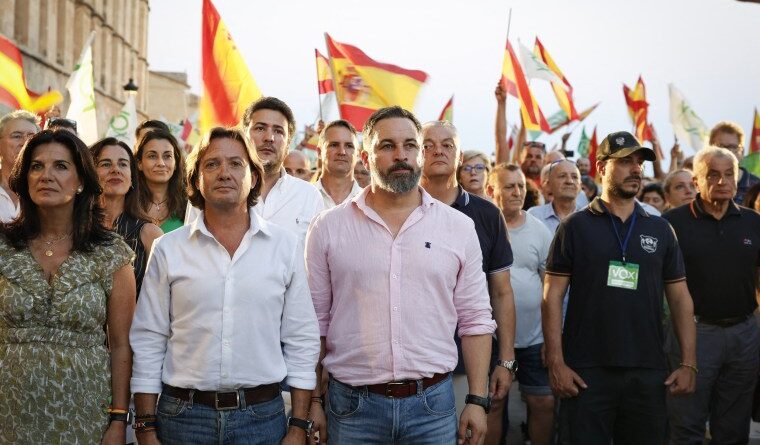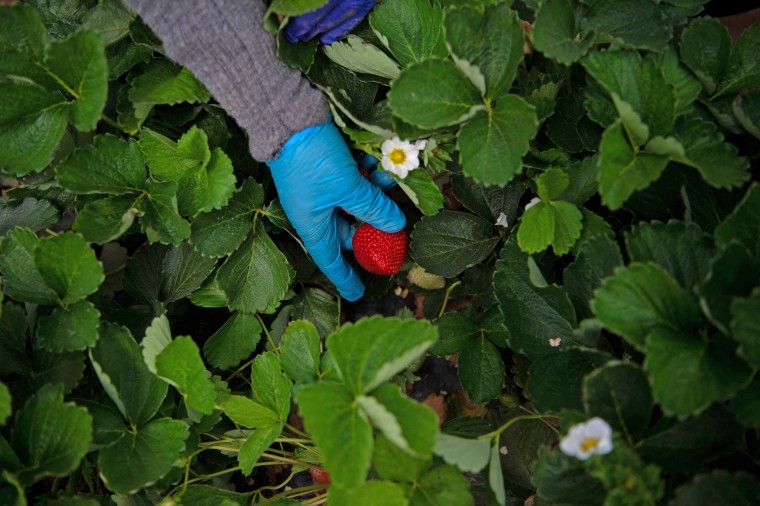
Spain could be on the verge of being governed by a coalition that includes a far-right party for the first time since the end of Francisco Franco’s dictatorship in 1975, fueled in part by frustration surrounding a drought and environmental measures to ameliorate it.
Polls indicate that the conservative Popular Party, led by Alberto Núñez Feijóo, has enough support to overthrow the president of the socialist government Pedro Sánchez, but will not achieve an absolute majority. That leaves Vox, an ultra-nationalist, anti-immigration, anti-feminist group, as the likely king.
Part of the reason Vox has become Spain’s third-largest party is that it has followed another key trend in modern far-right politics: the fear that green measures in Spain, which faces chronic droughts, will destroy the agricultural industry. Vox and the Popular Party, which already jointly govern the southwestern region of Extremadura, are backing a controversial plan to legalize and expand water drilling in one of Europe’s most important wetlands, much of which is already barren and lifeless, to feed the lucrative fruit industry.
Vox party leader Santiago Abascal, center, listens to the national anthem during a campaign event in Palma de Mallorca earlier this month.Jaime Reina / AFP – Getty Images
And now, issues that were previously considered resolved, such as the existence of human-caused climate change and its likely consequences, are being discussed again, said Oriol Bartomeus, professor of politics at the Autonomous University of Barcelona.
“Global warming had fallen out of the political debate because it was something that was part of the general consensus, but now it’s becoming more and more of a polarizing issue,” he said. “Therefore, if you are from the right, you are against the ecological transition. And that’s very scary.”
For decades, farmers have been draining the aquifer in the Doñana area west of Seville in southern Spain, a region that includes the UNESCO-listed Doñana National Park, to provide the thousands of liters of water needed for the local red fruit economy, which consists mainly of strawberries, raspberries, blueberries and cranberries.
Takes an estimate 42 gallons of water to produce just 1 pound of strawberries, according to the ethical consumer guide HEALabel.
A so-called “strawberry plan” law passed in 2014 allowed large amounts of drilling, but illegal wells proliferated regardless. The Popular Party, which controls the regional government in Andalusia, intends to declare an amnesty on the use of water from illegally drilled wells and expand irrigable land to 4,000 hectares, with the strong support of Vox.
Growing strawberries is big business: one local province, Huelva, provides 98% of Spain’s entire strawberry harvest and 30% of the strawberries consumed in the 27 countries of the European Union.
 A woman picks a strawberry in Ayamonte, Huelva last year.Jorge Guerrero / AFP via Getty Images
A woman picks a strawberry in Ayamonte, Huelva last year.Jorge Guerrero / AFP via Getty Images
But where there used to be open water providing habitats for 500,000 waterfowl, some areas of Doñana now look like a desert. A report earlier this year by Spain’s National Research Council concluded that 59% of Doñana’s large lakes had not been filled since 2013. Its largest lake, the Santa Olalla Lagoon, dried up last year for the third time in 50 years.
“Cash crops are an important source of income for Spain and that’s not going to last if you’re just going to keep drilling,” said Pieter de Pous, a climate policy expert at the Berlin-based environmental think tank E3G.
“That’s the kind of question you have to start grappling with: How much of a future is there for this land-use model?”
Vox, which says many families depend on illegal wells for their livelihoods, is calling for much wider use of the water, regardless of the impact such changes will have on the already degraded environment.
“Neither globalist agendas nor separatist concessions can prevent access to water for all,” Santiago Abascal, who helped found the party in 2013 and began leading it the following year, tweeted last month. He also called for Spain’s water basins to be connected to allow drought-stricken areas to benefit from water from other regions.
Interfresa, which represents Andalusian red fruit growers, told NBC News in a statement that up to 30,000 jobs could be lost due to the lack of water and that it supports it. the Vox and Partit Popular water plan because it gives “legal security” to its members.
UNESCO said in a statement earlier this year that it was “concerned” by the plan.
Abascal, who has called for a “reconquest” or reconquest of Spain, a reference to the Christian victory over The Muslims, who ruled much of the Iberian Peninsula for centuries until 1492. This kind of dog-whistle rhetoric that falsely implies that the country has been occupied by foreigners—and often non-whites and non-Christians—is a frequent refrain among the right in Europe.
The latest data available for 2022 from the National Institute of Statistics of Spain show that just over 7.5 million people with a population of more than 47 million people were born abroad.
While calling for lower taxes and the elimination of corruption, Vox also opposes measures against gender-based violence and pro-LGBTQ laws, and advocates the deportation of undocumented migrants.
In 2020, Abascal told Sánchez in a parliamentary debate: “You lead the worst government in 80 years,” a period of time that includes the Franco regime.
Like other far-right movements across the continent, Vox has sought to portray green measures as part of a liberal conspiracy to increase control over people through “climate locks” or permanently change society by limiting agriculture.
“Many far-right parties in Western Europe do not necessarily deny climate change as a phenomenon. “However, they deny that it is man-made and wrongly claim that the ongoing temperature rise is ‘natural,'” said Manès Weisskircher, an expert on far-right politics and ecological issues at the University of Dresden in Germany.
And Vox is part of a Europe-wide trend of far-right parties gaining support at the polls. He has forged successful links with nationalist parties across Europe, notably the Brothers of Italy. Immediately after Vox performed well in June’s regional elections, Abascal traveled to Hungary to meet with its Christian nationalist leader, Viktor Orbán.
This international support is important and is part of the normalization of voting for an extremist party, experts believe.
“You can be a conservative voter and you can think about voting for Vox because in the end they are normal – you have the same kind of parties in the governments of Italy and Scandinavia,” Bartemos said.
“We have experienced a certain normalization of thoughts and values and political attitudes that were unacceptable just a few years ago.”
While Vox did not respond to NBC News’ request for comment, Rafael Bardají, a political consultant who co-founded Vox as an offshoot of the Popular Party in 2013 and is close to Abascal, acknowledged that he believed the party was poised to take power in this weekend’s election.
“If the PP is around 140 seats and below and Vox holds at least 40 seats, I think it’s inevitable,” he said, speaking by phone from Los Angeles, where he often visits on business. “All the polls now say Vox is in crisis, but I don’t believe it as much as they say.”
Bardají no longer officially represents Vox and left its executive committee two years ago for health reasons, but still advises the party informally.
He also rejects comparisons with Franco, despite Abascal’s refusal to reject the dictator’s legacy. Instead, he says, the party honors tradition and country.
“I don’t think we’re as far-right as people try to make it out to be, like we’re fascists or something,” he said.
“Trump had this slogan ‘America first’: we want the Spanish first. When it comes to illegal immigration and so on,” he added.
[ad_2]
Source link





